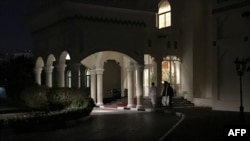A senior Iranian diplomat has cast aspersions on U.S.-led efforts aimed at finding a negotiated settlement to the war in Afghanistan, and refuted allegations Tehran gives military aid to Taliban insurgents to hurt the peace process.
Iran's ambassador to Pakistan, Seyyed Mohammad Ali Hosseini, insisted while delivering a public talk Thursday that his country is not averse to Afghan peace efforts. But Tehran is "doubtful" about Washington's intentions and role in the ongoing U.S.-Taliban talks, he said.
"Where there is a role of Satan or America, we cannot expect anything good from that," said Hosseini when asked whether Iran believed the U.S.-initiated peace process would help end the 18-year-old war in the neighboring country.
Speaking at the non-governmental Islamabad Policy Institute, the Iranian diplomat stressed the need for placing the Afghan government at the center of any peace dialogue.
American and Taliban representatives have been engaged in closed-door meetings in Qatar, trying to agree on a "significant and lasting" reduction in insurgent violence before signing a peace deal the two sides have negotiated over the past year.
Kabul has been kept out of the process from the outset due to opposition from the Taliban, which dismisses the Afghan government as an American puppet.
The troubled dialogue in Qatar, however, seems to have again slowed down, if not deadlocked as both sides are sticking to their guns.
Insurgent sources say the Taliban has proposed scaling back battlefield attacks for one week to conclude the deal, but the U.S. side wants the reduction in violence to continue until intra-Afghan negotiations begin.
If signed, the U.S.-Taliban agreement would set the stage for a gradual American troop withdrawal from Afghanistan and open the way for Taliban-Afghan negotiations on a nationwide cease-fire and power sharing.
Taliban ties
Iran maintains close contact with the Taliban. U.S. officials and even authorities in Afghan provinces adjacent to the Iranian border have accused Tehran of covertly providing military assistance to the insurgent group.
Hosseini rejected the allegations as baseless, saying Iran seeks peace and stability in Afghanistan.
"And this cannot happen through militarization (of the conflict) but through an inclusive reconciliation process involving all (Afghan) groups in that country," he asserted.
Taliban representatives have repeatedly visited Tehran in recent months to brief Iranian officials on their peace talks with the United States. The insurgent group also denies it receives military help from Iran.





